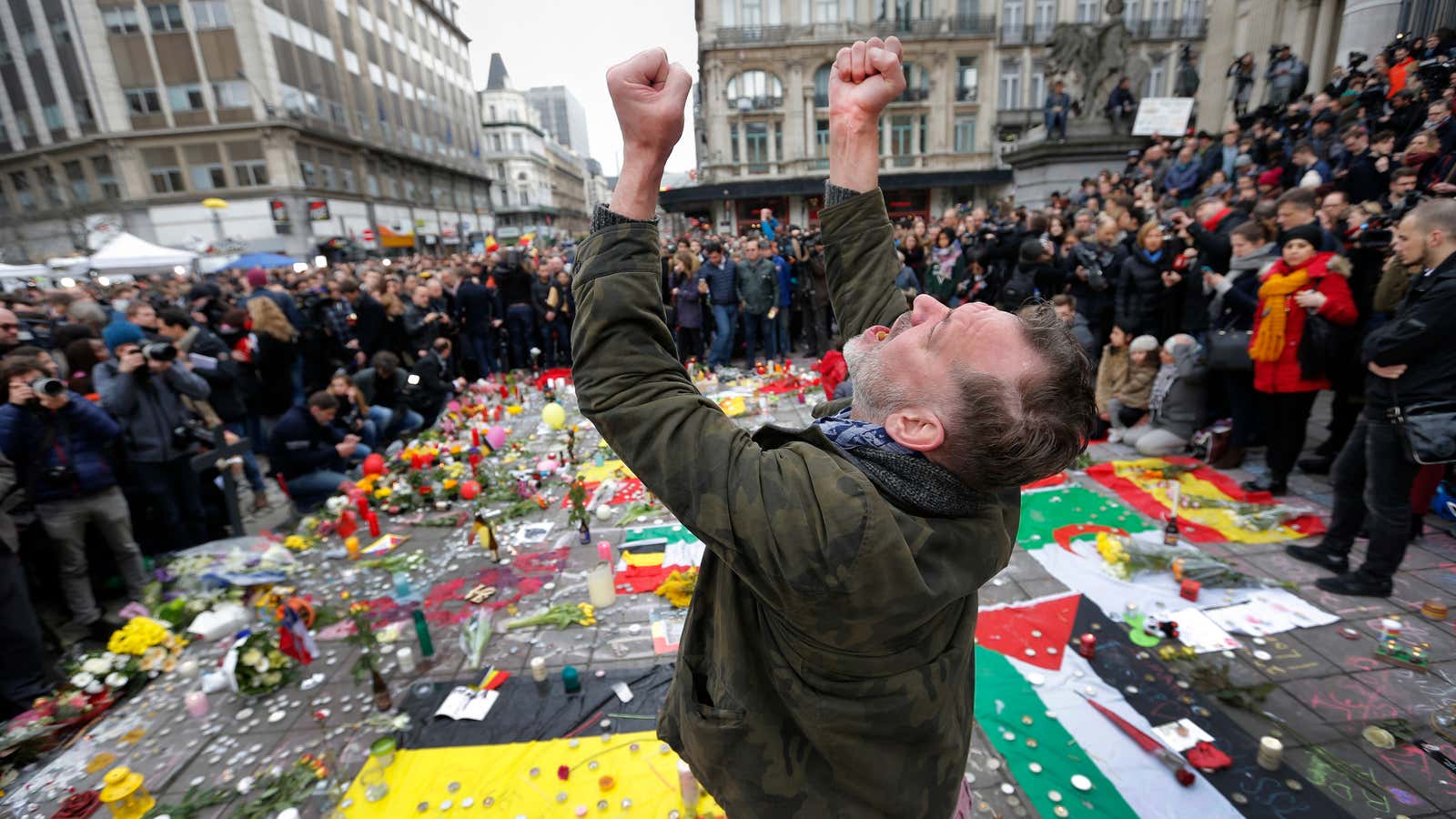We have seen, in under a year, two terrible attacks against two major European capitals. Not to mention the recent bombings in Istanbul and Ankara, Turkey. It seems the entire continent, from one end to the other, is vulnerable not only to violence, but to sophisticated and coordinated assaults. The terrorism in Brussels is perhaps even more shocking because it comes so soon after Paris, and because the city hosts much of NATO’s and the European Union’s infrastructure.
At a time like this, we mourn the victims. We challenge the ideology of the attackers. But we must also think about what we can do to make ourselves safer. Part of the strategy will be forensic: Closely and carefully examining the attack, in order to see what we missed, what our enemy is learning, and how we can better defend ourselves. But part of that strategy must also be reflective. Why does it seem like terrorism isn’t going away?
In fact, why does it seem to get worse?
The answer might be painful for some people to hear. But innocent people are dying, in large numbers in the West, and in far greater numbers in the Middle East. The time for tiptoeing around awkward truths has long since passed. Let us be clear: Western leaders, especially in the US, still cling to outdated views of the world, and the actions that proceed from them. We still seem to believe that we can sustain ill-conceived foreign policies without serious consequences. With Western power declining relatively, this world view is not going to work for much longer, if it is even still working.
Take a look at the massive gap between rhetoric and action.
At this weekend’s annual American Israel Public Affairs Committee (AIPAC) conference, every US presidential candidate, save Bernie Sanders (who declined an invitation to speak), went out of her or his way to insist on unconditional support for Israel. The more ironic moments included Democrat Hillary Clinton describing any boycott of Israel as necessarily anti-Semitic, followed by Republican Ted Cruz one-upping her by urging the shutdown of peaceful campus campaigns promoting boycotts of Israel.
In order to fight terrorism, stabilize the Middle East, and reduce the threat inside our borders, we need to build trust with Arab and Muslim populations, which demands some level of sincerity and receptivity. What are your concerns? What are your fears? How can we better work together? The AIPAC conference indicates that nearly all of our presidential candidates continue to live in a world where Arabs and Muslims are not equally human.
Such double standards were bad enough when we had undisputed dominance over the Middle East. But now? If, as Hillary Clinton suggests, boycotts of Israel are anti-Semitic, aren’t sanctions of Muslim countries inherently Islamophobic? You can disagree with such boycotts, of course; I believe academic and cultural boycotts are self-defeating and otherwise morally problematic. But the message being sent right now is: Your concerns aren’t real concerns.
Ted Cruz, meanwhile, broadcast the message to the wider world that Western democracy means free speech for everyone—who agrees with him. Muslims must eschew violence, he argued, while also eschewing non-violence. This is not to say that Israel and Palestine are the axis around which the Middle East revolves. But our inability to show the least concern for Palestinians indicates that our mindset is still dangerously bigoted.
Arab and Muslim causes and concerns still don’t matter enough, something reflected in public policy time and time again. This is not the end of World War II, when America stood nearly unchallenged in the world. America can’t get anything done without talking to partners around the globe. It has to build relationships. Donald Trump, especially, seems intent on burning every bridge he can find, even with America’s allies. His rhetoric on Muslims alienates even those committed to join the US against ISIL.
Times are changing. America and its allies have to change with them.
The idea that the US—or any country—can cross the planet, invade other countries, and never own up to what it has done was always problematic. Now we see why it was so dangerous to begin with. Meanwhile, the West generally is becoming increasingly incapable of imposing its will on Muslim-majority societies, as we’ve seen in Iraq, in Syria, and even in America’s relationship with allies like Saudi Arabia.
Worse still, dangerous and brutal elements within these societies are increasingly willing and able to mount strikes at great distances. This is nothing compared to our own military power, but also a sea change from where things stood even ten years ago. None of America’s presidential candidates seems to understand this. The US needs a complete reevaluation of how it relates to the Muslim world, and that requires some very deep strategic and theoretical shifts, beginning with this truism: Violence begets violence. Violence across borders begets violence across borders.
Today, we best honor the memory of terrorism’s many victims by electing politicians that keep the US more secure, and the rest of the world more stable. Terrorism has moral causes, and these can be, must be, and are being addressed; at the same time, we must also face up to the political decisions that give extremists oxygen. Part of that is continuing to examine the congenital refusal of our leaders to ever imagine that their own actions might be working at cross-purposes to their stated intentions.
